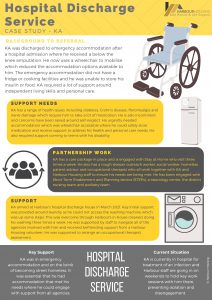With the Care Bill entering the report stage in the House of Commons shortly, Michelle Cornes urges us to take part in the debate over what constitutes eligible need in relation to adult social care and support. Dr Cornes is Senior Research Fellow at the Social Care Workforce Research Unit (SCWRU) at King’s College London and recently completed a major ESRC-funded project examining Multiple Exclusion Homelessness. Her work forms part of the Homelessness Research Programme at SCWRU.
As funding for Supporting People services continues to shrink (see Patrick Butler’s article in The Guardian, 12 February 2014) it is timely to revisit the question as to whether homeless people are eligible for publicly funded social care support (e.g. personal budgets secured through adult social care) or personal health budgets. The Care Bill currently going through Parliament heralds some positive changes that may serve to open the door to this funding stream which has, de facto, mainly been closed to homeless people. As the law currently stands ‘homeless people’ are not eligible for support (though ‘homeless people’ with mental health, physical health, and drug and alcohol problems may be). The Care Bill will remove ‘eligible’ and ‘ineligible’ groups so that any adult with any level of need will have a right to an assessment (Department of Health 2013: 1.9).
Under the existing guidance, the purpose of a community care assessment is to assess need in the round. The guidance is clear that needs relating to social inclusion and participation should be seen as just as important as needs relating to personal care (Department of Health 2010: 61). It is perhaps worth noting that housing related support can be purchased using a personal budget from adult social care. In Scotland, 11% of direct payments and self-directed support packages in 2012 encompassed this element (Rosengard et al. 2011).
Once a community care assessment has been carried out, a decision must then be taken by the local authority (on a case-by-case basis) about whether the needs identified are eligible needs. The eligibility framework is graded into four bands which describe the seriousness of the risk to independence or well-being (Department of Health 2010: 54). This considers issues such as the ability to carry out personal care or domestic routines, whether vital involvement in work, education or learning can be sustained and if vital family and other social roles and responsibilities can be undertaken. Risks are banded as low, moderate, substantial and critical with many councils only meeting those needs identified as substantial or above.
Making decisions about which banding to apply and ultimately, who is eligible for a ‘personal budget’ is open to professional interpretation. With increasing austerity, the regulator has taken issue with those local authorities identified as being too restrictive. For example, Michael Mandelstam highlighted a recent case in which a local authority visited a woman at home, assessed her as managing her own personal care and closed the case—having first recorded that she was unkempt, her knickers were around her knees, there was evidence of faeces on the floor and she was not taking her medication (2013: 123).
Evidence from the Multiple Exclusion Homelessness Research Programme (Cornes et al. 2011) and other studies suggests that people who are homeless fare particularly badly in getting their needs banded correctly, often struggling to access an assessment at all. There is evidence that homelessness is written off as ‘lifestyle choice’ or as a housing responsibility, with the ‘substantial’ and ‘critical’ risks posed to well-being ignored or overlooked. The notion that homelessness poses mostly low to moderate risks to well-being is most clearly challenged by the startling statistic that the average age of death of a homeless person is 47 (43 for a homeless woman) as compared to 77 for the general population. The Care Bill (page 2) makes explicit the need to challenge discriminatory practices so that decisions about the individual are made having regard to all the individual’s circumstances and are not based only on the individual’s age or appearance or aspect of the individual’s behaviour which might lead others to make unjustified assumptions.
The problems with the way eligibility criteria are being applied are acknowledged by the Coalition Government. The Care Bill will introduce a national minimum threshold for adult care and support and there are plans to replace the current ‘Fair Access to Care’ (FACS) eligibility criteria in 2015. A new description of what is eligible need will be put forward for consultation in 2014 and a discussion document is already in the public domain (Department of Health 2013). I would urge all those working in the homelessness sector and those interested in challenging social exclusion to respond to this consultation. Without doing so there is the danger that homeless people will continue to be denied the support they are entitled to and, given what we know is happening to Supporting People services, possibly robbed of the little support many already have.
Dr Michelle Cornes is Senior Research Fellow at the Social Care Workforce Research Unit. She recently completed a major study on Multiple Exclusion Homelessness funded by the ESRC. For work on homelessness at the Social Care Workforce Research Unit at King’s see our Homelessness Research Programme pages.
The Social Care Workforce Research Unit is part of the King’s Policy Institute (KPI) at King’s College London. The Institute is involved in the translation of academic research at King’s to the benefit of policy and practice.
References
Butler, P. (2014) ‘If supported housing is cut, we will see more rough sleeping and more crime’. The Guardian, 12 February 2014.
Cornes, M., Joly, L, Manthorpe, J., O’Halloran, S., and Smythe, R. (2011) ‘Working together to address Multiple Exclusion Homelessness’, Social Policy and Society, 10(4): 513-522.
Department of Health (2010) ‘Prioritising need in the context of Putting People First: a whole system approach to eligibility for social care – guidance on eligibility criteria for adult social care, England 2010’, London: Department of Health.
Department of Health (2013) ‘Draft national minimum eligibility threshold for adult care and support. A discussion document’, London: Department of Health
Mandelstam, M. (2013) Safeguarding Adults and the Law. London: Jessica Kingsley.
Rosengard, A., Ridley, J. & Manthorpe, J. (2013) ‘Housing support and personalisation: observations from the Scottish Self-Directed Support test sites’, Housing, Care and Support, 16(3/4): 136-144.


